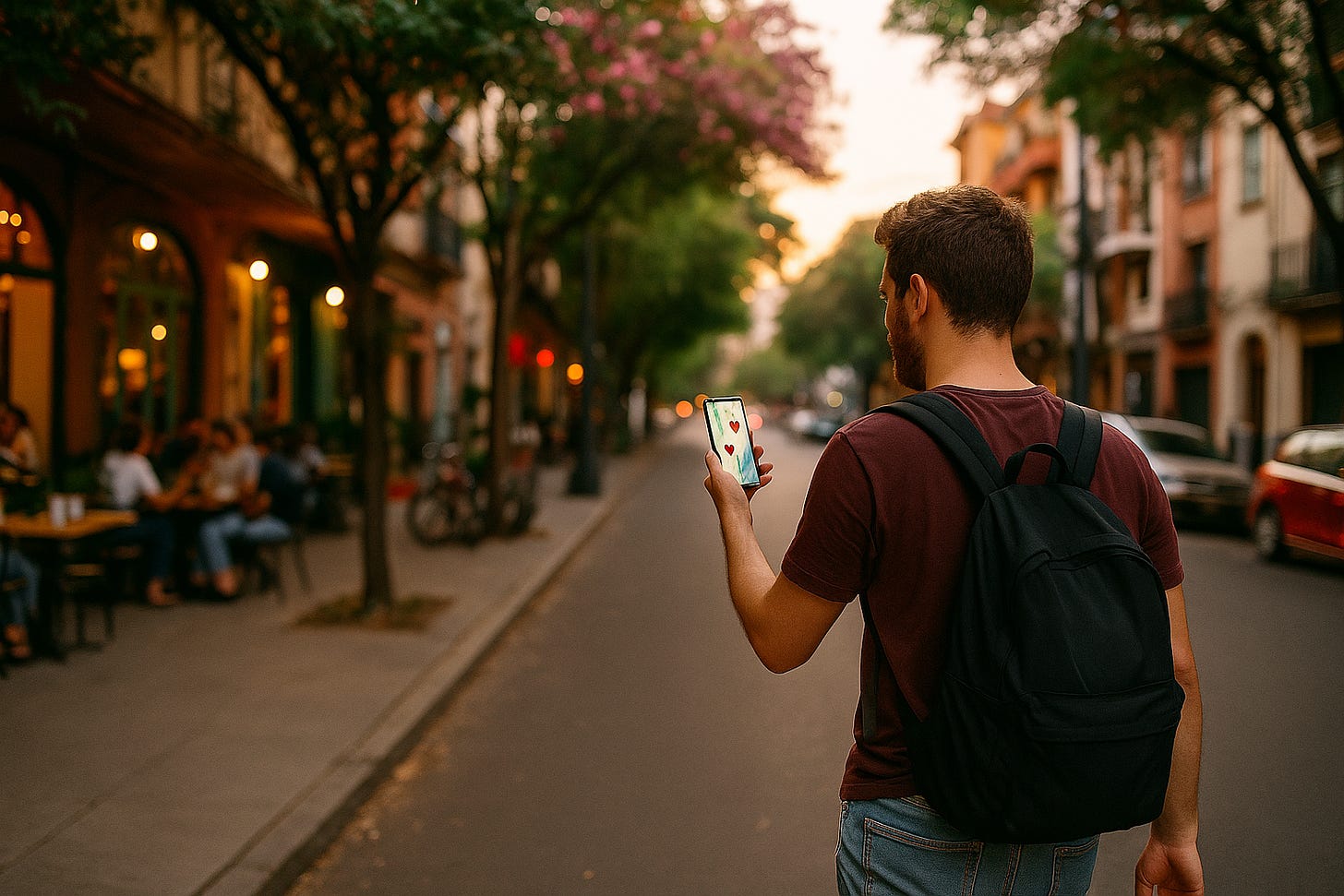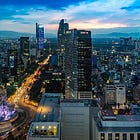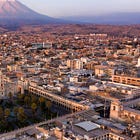The First 90 Days as an Expat
How To Build Your New Life Fast in Any New City
Moving to a new city is only “brave” if you actually leave your Airbnb. Most people touch down, open their laptop, order Uber Eats, and wonder why they feel invisible. I’ve made these moves multiple times. Germany, Hungary, Korea, and now four years in Mexico City to know the difference between “I know everyone here” and “I went home early”
This playbook is for mid-20s to mid-40s readers (mostly men, some women), with a $3k+ monthly budget and enough risk tolerance to buy a one way ticket. You want friends, dating, business, status all of it. You’re optimizing for big cities (CDMX first), though beach towns are often the first stop. You don’t want roommates. You won’t live far from nightlife. You’re willing to pay for speed (private language teacher, better gym, better area) because time is the expensive thing.
Here’s how I have learned to break down my moves in the past and present:
A 72-hour landing sprint to create momentum.
Month-1 “surface area” tactics to get a lay of the land.
Month 2 moves to move you from city guest to city regular.
Month 3 hosting and status plays most nomads never attempt.
Building A parallel dating funnel that fits the city.
Street smart knowledge, traps, and a cadence that keeps you sharp.
KPIs at Day 30 / 60 / 90 ( Adding this due to my sales background)
The 72-Hour Sprint (Week 0)
With my old military mind at play, I say I don’t “arrive.” I deploy. Before wheels down, I’ve already booked an Airbnb in a walkable pocket within 15–20 minutes of the bars, gyms, and restaurants I’m likely to use. I don’t lock a year lease; I Airbnb hop monthly for the first 2-3 months to test neighborhoods. The fancy penthouse across town is worthless if it’s a 40-minute Uber from everything and you never go out because “traffic.”
Day 0–1
Check in, shower, and walk the neighborhood for an hour or 2. No Ubers..Feet on concrete. You’re learning light, noise, people flow, and what the street feels like after dark.
Buy a local SIM. Save your global eSIM drama for Reddit. Its always going to be cheaper to get a local chip and some data. * I often have an ESIM either way for emergencies, but I'll get the absolute lightest package.
Drop pins in Google Maps: 3 cafés, 2 gyms, 2 wine bars, a speakeasy, 1 late-night taco spot,whatever stuff you like in the areas Create a list called “Home Base.”
Day 2
Hit day passes: two gyms, one cowork, two cafés. Talk to staff. Learn names. Tip like an adult, not a backpacker.
Open Instagram. Clean your top 9 grid (I’ve got a photo guide). A feed that says “I live here now” changes how locals see you.
Fire off 5–10 DMs (hosts, photographers, trainers, promoters, community managers). “Hey, I just landed. I’m mapping the city. Is there anything good this week?”
Day 3
Do “tourist” items you will otherwise never do once life starts (museum + city overlook / archaeological site). Get it out of your system now. The longer you wait, the more likely you’ll never go. Ask me about the number of people who “lived” in a European capital and never saw the inside of its best museum. I lived in Atlanta for years also and never went to the coke museum.
Neighborhood Tips:
Walkability over everything. First 90 days = short-term flexibility. Don’t over-optimize rent at the cost of location. I’ve written on housing and “gringo pricing” signals. If a building feels sketchy, it is. If the block feels dead at night, you’ll be dead socially.
Month 1: Build Surface Area
Most of you work from a laptop. Do it outside. You’re not in a new city to recreate your old living room.
Work in public. Rotate 2–3 cafés and a cowork so staff and regulars recognize you, but also so you get a better lay of the land. Morning routine matters: same time, same order. People talk to people they’ve seen before. Even if you’re eventually going to be moving every month or so until you find the place you like, it helps to build small friendly contacts around the city.
Pick a gym you like and show up at consistent hours. Day passes first, then commit. A lot of gyms are also negotiable on prices. You might see a price listen and be able to pay cash for a month fee until you decide where you’re going to stay for good.
Hire a private language teacher. Not a class. Pay for speed. Three 60–90-minute sessions a week. Your job isn’t to “avoid faux pas” yet. Your job is to absorb the rhythm of the city fast. I’ve written the full app stack you’ll need (rideshare, event platforms, delivery, language); use it as your checklist.
Do the tourist circuit early. Knock out 6–8 marquee experiences in the first two weeks, not month five. You’ll stop being a tourist faster by getting the tourist stuff out of your bloodstream.
Instagram + WhatsApp. Post two stories on days you’re out. Not try-hard. Think “glimpses.” Save receipts: staff names, places, small wins. When you DM later, your grid proves you’re not a transient chaos gremlin.
Month 2: From Guest to “Known Regular”
Now you’re switching from exposure to intent.
Try to meet these five roles in every city:
a venue owner or manager
a gym coach or class instructor
a photographer
an event organizer or community manager
a trusted driver (Uber or private)
Value adds. Make sure you can also be value adds to these people. Bring two extra guests to a slow night. Recommend some girls you meet to the photographer. Pass the drivers name to other people in need. I have an odd amount of contacts that I might not have seen for over a year, but I always recommend them to friends and contacts I meet. I have a couple tour guides that I have been sending people to for years.
Regular etiquette. Remember names. Tip in a way that’s memorable but not obscene. Don’t get sloppy drunk at your core spots. Reply to invitations fast and show up when you said you would. This is especially useful when you are new. Just say yes to everything…but mean it. If you say yes. actually show up. This sets you apart especially in latin america where people say yes to things and never show up
This is the month you stop acting like a tourist and start acting like someone who might be around for a year.
Month 3: Host (Most People Never Do)
This becomes a hard part for most people..Most people live in other people’s plans until they fly out. Hosting is the difference between “I know people” and “I am a node.”
Format: dinner for 6–8, a rooftop drink hour near your place, gym+brunch, or a gallery crawl ending at a wine bar. You want conversation, not chaos. Considering you may not have signed a lease just yet. You might not have the most solid apartment to host people yourself, but you can host somewhere near your place.
Guest mix: Try to put in like 50–60% locals, 40–50% expats. Try to include at least one or two of the “connectors” (promoter, manager, photographer, community host). Avoid packing the room with foreigners who only talk to each other. Of course, some people will not show up, so i would actually overinvite people while still trying to make a mixed event where everyone will be forced to interact vs stay in their indiviual circles
Documentation: a few IG stories, no ring lights, no “Welcome to my community” TED talk. Tag the venue and thank them the next day.
By the end of Month 3 you’ve either decided to keep renting, switch neighborhoods, or sign a 6–12-month lease. You also have enough stories and photos that your IG reads as “lives here now,” not “took a long weekend.”
Dating - Run in Parallel
My funnel is simple and local: IRL and IG, some apps if the city warrants.
Meet places: gym classes, wine bars, bookstores, the park with dogs, the morning café.
Opener: This is something you really have to explore on your own. But one of my favorites has been something liie. “I’m making a short list of wine bars near here—ever been to XX?” Then ill toss a random cocktail bar that i found on google maps that isnt a pure tourist spot.. just to get recommendations and start conversation with people.
First meets: 45–60-minute wine or café walk. Keep it low effort and near your apartment.
Green flags: punctual, curious about your actual life, not obsessed with filming the night.
Red flags: the five we’ve covered before—Uber Daddy, Rent Drop, Lifestyle Girl, Insta Climber, Love Bomber. If you see two of those in one person, eject.
Boundaries: you don’t subsidize random bills; you don’t become a content prop; you don’t move logistics across town at 11pm.
Dating is better when your social life is already solid. Build the room first, then invite someone into it./
Safety, Scams & Common Sense
Couple rules I live by that should keep you from making easy mistakes
Phone discipline. Keep it in front pockets, not back. Don’t walk-and-scroll at during the day at night. If you need to use your phone…stop, pull it out, personally face away from the street or towards a wall. Ive never been pickpocketted, but ive heard multple cases of people getting their phone swiped by someone on a bike or motorcylce.
Transit at night. Uber or a trusted driver door-to-door. If you’re walking, keep it under 10 minutes on lit streets you already know. Rule 1 and 2 can be lightening as you get comfortable from living in the area for longer
Cash & cards. Carry small bills for tips; keep main card separate from “night” card.
Common scams I’ve seen across LatAm/Europe/Korea:
Taxi meter “malfunctions,” cash swaps, or long routes. Solution: ride hail, or agree the fare beforehand and use your own map as a quiet anchor.
Venue over charges for bottles or “mandatory” service fees. Solution: ask for the menu, point to the line, confirm the total before paying.
Street “helpers.” They’ll sell you solutions you didn’t need. Solution: polite no + keep moving.
Police interaction. In most places: be calm, respectful, and boring. Do not escalate. Have your ID. If you have an issue, escalate later with a local advocate, not in the street at midnight. I would personally have the number to the embassy in your phone. It’s great to have a live line, but simply making the call in front of cops sometimes will get them to tone things down.
Work, Structure & Sanity (Month 1–3 Cadence)
Build a solid schedule. A lot of people burn out because they don’t have a schedule and end up getting swamped with work while trying to play to much.
Stay in shape: at least 2 days lifting, 1–2 lighter cardio/steps days. Don’t be fat
Language: 3 sessions with your private teacher + 1 meetups/dates or whatever you need to continue getting good at the language in the first 3 months. I believe this is critical that you start learning early. If you manage to go months without learning the local language, from what ive seen with a lot of expats and nomads is that they are less likely to learn as time goes on because they end up building social circles of just english speaks, which eventually boxes them in from exploring more
Social: 2–3 nights out, not 5. Pick quality vs quantity. You don’t need to go every every night of the week drinking or staying out late. Thats an easy way to burn money, burn your body out, or fall behind on your work.
Creation/Work: block 2-3 deep windows (90–120 minutes) in the morning to get things done either speficially work work or for your own personal time. These always keeps you a little ahead just in case theirs a day or days where you binge on fun. For blog purposes. I may start writing 2-3 blog post and keep them in drafts so Im never starting purely from scratch
Reset day: one day per week off alcohol, off social, long walk, groceries, laundry, calls home. Burnout is real. Most people get sick once because they try to live like a Spring Break documentary. I was sick for over a month at the end of month 2 in mexico because i spent way to much time having fun. This was also during covid, where i was lucky not to catch it, but i was still down for a month with flue symptoms.
KPIs: Day 30 / 60 / 90 Sum of everyting
By Day 30:
Two venues where staff know your name and order.
handful of local friends followers on IG/whatsapp that you can ask about venues, or try to invite out,
One weekly standing plan (class, language, or a regular wine night).
A gym you like at a consistent hour.
By Day 60:
You’re in at least two group chats that you didn’t create. ( Easy because every large city has a couple event and community based whatsapp groups for everything you could need)
You’ve been invited to something you didn’t discover yourself.
Three “roles” met (owner/manager, photographer, coach).
By Day 90:
You hosted one event with people and it didn’t suck.
Three go-to venues (coffee, gym, bar) where you’re a regular.
Two real friends you’d call for help (not just party acquaintances).
A clear decision on neighborhood + lease horizon.
If you can’t hit 60-day KPIs, you aren’t outside enough or you’re choosing the wrong rooms.
Second City vs. Capital
Capitals have gravity: bigger scenes, bigger egos, higher prices, more noise. Second cities often win for integration, safety, and sane prices, especially in Latin America. If you’re getting class friction (resentment toward foreigners with money), or you keep meeting only other foreigners, a second city can fix it fast.
When to pick second city: your budget is strained but you won’t compromise location; nightlife is eating your sleep; dating feels like professional networking; locals feel “over” foreigners.
When to stay capital: you’re building a business that needs raw volume; you thrive in density and can afford it; you’ve already built a regulars network in two or three neighborhoods.
(We’ve got a whole piece on the Second City Strategy; this article slides right into it.)
In the end
In three months you can either become a fixture or a ghost. You make the choice
If there’s something I missed in this article: search the blog catalog because I’ve written many articles, or leave a comment or question for me to anser
















